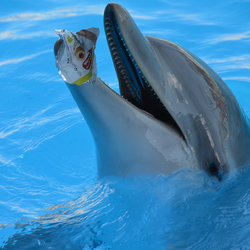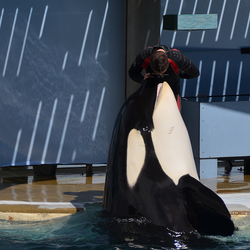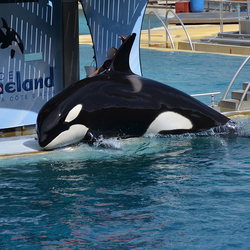
Cetaceans also die from coronaviruses: let's close the dolphinariums and ban their export to China!
As humans around the world try to cope with the covid-19 pandemic, expert scientists who specialize in orcas, dolphins and belugas, with whom we have worked with a long time, have called on us to help alert people to the fact that cetaceans can also contract this type of virus. They can contract it, pass it on and die from it.
As humans around the world try to cope with the coronavirus pandemic, and that at least one of the seven tigers and lions coughing at the Bronx Zoo has just tested positive for covid-19 after human contamination, expert scientists who specialize in orcas, dolphins and belugas, with whom we have worked with a long time, have called on us to help alert people to the fact that cetaceans can also contract this type of virus. They can contract it, pass it on and die from it.
Long before the parks were closed, which was imposed by the French government on March 14th and 15th of 2020. International cetacean experts had written to Emmanuel Macron and to the ambassadors of China, the United States and France, to inform and urge them to immediately ban imports and exports of cetaceans (especially outside of France) to China. To date we have not received a reply, they remain silent…
The international experts with whom we have been working for many years are concerned about the transfers of free and captive orcas and other cetaceans to China, especially those who are detained in French dolphinariums.
Indeed, these experts have shown that cetaceans are affected by forms of the coronavirus. Several dolphins in Hong Kong, in particular have never shown symptoms, which in itself is very worrying because they were therefore “healthy carriers”. A beluga, meanwhile, died with serious liver problems associated with this virus.
Experts also noted that the captive industry (dolphinariums, aquariums and zoos) is keeping the cause of many deaths a secret, which is really problematic in terms of public health – as this makes it impossible to assess the extent of the coronavirus in cetaceans. Many others may exist, and they are not made public by the parks.
Obviously, by preventing the captive industry from bringing in more orcas, dolphins and belugas from the wild, the authorities would limit the reservoir of viruses that could potentially be transmitted to humans. By prohibiting their transfer from one country to another as well.
In support of our campaign, experts have alerted the authorities of the concerned countries
Several weeks ago, these experts, in support of our campaign, wrote to the ambassadors of China, the United States and France who are based in China as well as to Emmanuel Macron. It was important to inform them of these risks of zoonoses between orcas, belugas, dolphins and humans, first of all; ask them to close dolphinariums and zoos, places of interspecies contact; and also to ban the sending of orcas and other cetaceans, particularly to China, because of the risk of transmission of the virus. The authorities of these three countries have not bothered to reply, the problem is very worrisome.
We had already campaigned against the transfer of the orcas detained in Marineland following confidential information which we had received late last year. But since the emergence of the Covid-19 pandemic, the problem has widened further.
A few weeks ago, China and Vietnam announced that they would stop exporting wild animals. In reality, this ban is very incomplete: no mention is made of cetaceans.
Dr. Ingrid Visser, biologist specializing in cetaceans (Orca Research Trust, New Zealand), Dr. Naomi Rose, PhD, scientist specializing in marine mammals (Animal Welfare Institute, USA), and Muriel Arnal, founding president of One Voice (France), in a joint text, call on the authorities:
Since the writing of this text, forced by the government to avoid transmissions of the virus between spectators and dolphinarium staff, Marineland Antibes has closed its doors, as well as SeaWorld in the United States.
These closings have occurred very late and seem weak, given these overwhelming elements at the moment. The authorities must go further: prohibit the reproduction of wild animals in captivity and their transfer and importation from one park to another. In France, the publication of a ministerial decree would suffice for this.


